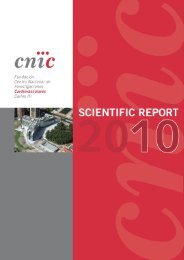Appendix - CNIC
Appendix - CNIC
Appendix - CNIC
Create successful ePaper yourself
Turn your PDF publications into a flip-book with our unique Google optimized e-Paper software.
SCIENTIFIC REPORT ´09<br />
Public-Private Partnership<br />
In spite of the enormous advances in diagnosis and treatment<br />
witnessed over the last 20 years, cardiovascular diseases<br />
continue to be the main cause of death in the developed<br />
world. The costs generated in economic, social and human<br />
terms are immense. In response to this reality, the Spanish<br />
Government, through the Instituto de Salud Carlos III (Carlos<br />
III Health Institue) of the Ministerio de Ciencia e Innovación<br />
(Spanish Science and Innovation Ministry), created the <strong>CNIC</strong><br />
to bring together the best of Spanish cardiovascular research<br />
and provide it with a modern infrastructure and ample<br />
funding to carry out world-leading biomedical research.<br />
To achieve the funding necessary for its ambitious plan, The<br />
Spanish government appealed to the sense of social<br />
obligation of some of the major players in Spanish civil<br />
society, by inviting the largest businesses in the country to<br />
make an active and long-term commitment to this project.<br />
The outcome was an agreement, signed in December 2005,<br />
between the Spanish Goverment and a group of some of the<br />
most important Spanish businesses. Under the terms of this<br />
agreement these companies pledged their commitment to<br />
funding the <strong>CNIC</strong> up until 2012. This commitment has<br />
recently been extended until 2020.<br />
Shortly after the agreement was signed, on January 24,<br />
2006, this group of companies was formally constituted as<br />
the Pro<strong>CNIC</strong> Foundation. Through its creation, some of the<br />
largest companies in the country have made a long-term<br />
commitment to biomedical research which represents the<br />
most significant act of business sponsorship in recent years<br />
in terms of the amount of funding it provides, its social<br />
significance, the group of companies involved, and the<br />
anticipated outcomes.<br />
Since the signing of this agreement, the <strong>CNIC</strong>’s funding is<br />
based on a public-private partnership of a broad, sociallycommitted<br />
nature. In this innovative PPP, state funding is<br />
complemented by financing through the Pro<strong>CNIC</strong> Foundation<br />
(http://www.fundacionprocnic.es).<br />
Funding<br />
119<br />
<strong>Appendix</strong><br />
New companies have since joined the Pro<strong>CNIC</strong> Foundation,<br />
and there are now 13 members: Acciona, Banco Santander,<br />
BBVA, Endesa, Fundación Abertis, Fundación Ramón<br />
Areces, Gas Natural, Grupo Prisa, Inditex, La Caixa, Repsol<br />
YPF, Fundación de Investigación Mutua Madrileña, and<br />
Telefónica. This funding scheme allows the <strong>CNIC</strong> to fund<br />
special programs for the discovery and training of young<br />
investigators, to award extramural grants aimed at integrating<br />
basic and clinical research to answer specific questions, to<br />
acquire specialized research equipment that would otherwise<br />
be difficult to fund, and to run programs to incentivize and<br />
retain valuable investigators.<br />
But the Pro<strong>CNIC</strong> Foundation not only provides the <strong>CNIC</strong> with<br />
money; it also contributes its accumulated managerial and<br />
business expertise. Representatives of the Pro<strong>CNIC</strong><br />
Foundation sit on the <strong>CNIC</strong>’s Board of Trustees, and actively<br />
participate in the management, planning and decision taking<br />
related to the Center. In this way, some of the most important<br />
organizations in the private sector in Spain have committed<br />
themselves to a direct involvement in biomedical research<br />
and the fight against cardiovascular diseases.<br />
A major strength of this socially-committed PPP model is<br />
that it provides a more solid base than traditional forms of<br />
charitable financing, giving the <strong>CNIC</strong> a more stable financial<br />
support than it would have if it depended on sporadic<br />
donations from benefactors. This stability gives the <strong>CNIC</strong><br />
greater freedom to commit itself to long-term, high-return<br />
research strategies in collaboration with public and private<br />
institutions, and allows for a more effective use of its own<br />
resources generated through competitive projects and the<br />
exploitation of intellectual property rights.



